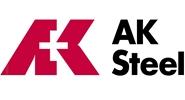Market Segment

January 27, 2015
AK Steel Reports Best Annual Performance Since 2008
Written by Sandy Williams
AK Steel claimed its best quarter in three and a half years and its best annual performance since 2008. AK Steel reported shipments of 2,010,200 tons in fourth quarter 2014 compared to 1.42 million tons in Q4 2013. The increase exceeded analyst expectations and was due primarily to strong demand from automotive and the addition of shipments from Dearborn Works. Sales totaled $2 billion with an average selling price of $987 per ton.
Net income was $13.5 million compared to $35.2 million in fourth quarter 2013. Income in Q4 was negatively impacted by $7.1 million in expenses related to acquisition of Severstal Dearborn and $5.5 million associated with pension and post retirement charges. The planned outage at the Ashland Works blast furnace incurred $31 million in costs and capital investments of $18 million.
![]() AK Steel reported adjusted EBITDA of $117.0 million, compared to $87.2 million in Q4 2013 and the net loss of $7.2 million in Q3 2014 with adjusted EBITDA of $100.5 million.
AK Steel reported adjusted EBITDA of $117.0 million, compared to $87.2 million in Q4 2013 and the net loss of $7.2 million in Q3 2014 with adjusted EBITDA of $100.5 million.
For full year 2014 net sales increased 17 percent to $6.51 billion. Shipments were up 16 percent to 6,132,700 tons. Average selling price for the full year was $1,058/per ton, slightly higher than $1,056/ton recorded in 2013.
The Dearborn acquisition costs of $31.7 million, pension charges, and multiple outages at Ashland Works resulted in a net loss of $96.9 million for the full year. The extreme winter conditions in early 2014 added $45 million in higher energy costs and transportation and operational costs associated with delivery of raw materials. Adjusted EBITDA for 2014 was $280.2 million compared to $255 million in 2013.
Dearborn Works added significantly to earnings results for 2014 with net sales of $567 million and shipments of 707,000 tons.
During Tuesday’s earnings conference call, CEO James Wainscott said Dearborn Works has exceeded expectations. Previously forecasted synergies of $25 million for the facility, acquired last September, are likely to be doubled in 2015.
The final financial contribution to Magnetation is complete and the pellet plant continues to ramp up, shipping good quality pellets to Ashland Works. AK Steel expects to receive one quarter of its pellet needs from Magnetation as part of the company’s long term strategy. Although, AK Steel is not required to make any more investment in Magnetation, Wainscott says if it makes sense for AK Steel to provide limited financial support in the future, it will do so.
The drop in iron ore price has been a boon for AK Steel. “AK Steel will clearly benefit if the IODEX continues to fall,” said Wainscott. The company added it has hedged 2.3 million tons of iron ore, 70 percent related to 2015 hedges.
AK Steel is advocating trade cases to provide relief for dumping of steel products in the U.S. The problem, says Wainscott, is too much supply for current demand. Between 2013 and 2014 carbon spot imports increased by 60 percent. “Put in perspective,” said Wainscott, “it is the equivalent of a newly formed steel mill appearing overnight in the steel market.”
The dumping of steel from troubled economies has put “undue pressure on spot market prices” and has affected contract pricing as well, said Wainscott. AK Steel expects 75 percent of its 2015 sales to take place in the contract market and 25 percent in the carbon spot market.
AK Steel continues to focus on steel products for the automotive industry and advancements in advanced high strength steel. AK Steel does not underestimate the threat from aluminum but expects use of steel to remain strong in the automotive industry. Sales to automotive were up 12 percent in 2014 with higher shipments expected in 2015. Wainscott noted that Joe Reynolds at Ford said he doesn’t expect to see a dramatic increase in aluminum bodied cars. Despite the buzz over the aluminum F-150, Wainscott says, “Steel, indeed, still matters.”







